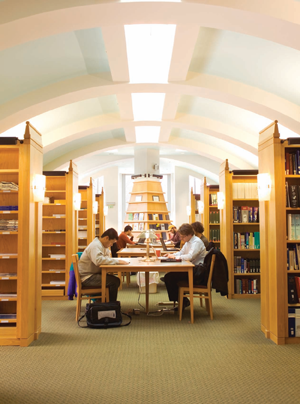 CAM: The CALS task force report calls for merging some departments. Is that what you have in mind?
CAM: The CALS task force report calls for merging some departments. Is that what you have in mind?
KF: Yes, CALS is my poster child for this. Their report says that over time we've evolved to have twenty-six academic departments, many in similar areas, and if we bring some of those related departments together administratively, then we will have greater visibility. It saves some money, but it's not so much about budget as it is visibility and excellence.
CAM: Another issue for CALS and the other contract colleges is state funding, which has been decreasing. How much of a driving force is that for reorganization?
'There are a large number of decisions that will require further study. But some are urgent—for example, what should the size of the freshman class be next year?'KF: The ability of the state to invest in higher education is constrained, and those cutbacks may be as great, percentage-wise, as any of the changes we will have to make. We will have to make tough choices about how we use state resources.
CAM: Some of the task force reports are a bit defensive—they're more like lists of what's already been done than plans for the future. How much of a problem is institutional inertia?
KF: We have great collegial relationships across the University, so I feel I have the freedom to push back on those deans and faculty who are saying the status quo is best. They may be right— but I'm not letting them off the hook from thinking deeply about the future. It may be that we are optimally organized in a certain discipline for the present, but that's not the same as saying we have the right structure and focus for the future. I'm thinking about how we can take the changes we have to make and use them to put us where we should be twenty years from now.
CAM: How do you assimilate all of the feedback you've been getting and make decisions?
KF: The feedback is wonderful—and I encourage alumni who may be reading this to send me their input. But, yes, it will soon be time to make decisions. For many of these, there is some sense of urgency. We don't want the University to be paralyzed as we figure out how we should be organized. So we will make many decisions in the next month or two. But there are also a large number that will require further study—especially with regard to the document that will capture our aspirations for the future. For that, there will be an extended process. Early in the coming year, there will be releases of initial ideas; we will put these on our website and invite feedback.
In some areas, I will consider everyone's input, discuss it with the president, and make a decision. For many of the issues, I will need to indicate whether we should or should not consider them further. If we should, that will mean more work and more discussions. The complex ones, like changing the focus of a college or academic program, will require a great deal of consideration. But some are urgent—for example, what should the size of the freshman class be next year?
CAM: How much are the trustees involved in the process?
KF: We give them updates every time they meet, particularly in the area of administrative operations and the budget. On the academic piece, they're encouraging us to make bold and creative decisions and saying, "That's your domain. Let us know what you decide, but don't be timid. Do the things that will make this a better institution." They're very engaged in helping us right the financial ship and making sure we keep on schedule for the budget part, and they're very interested in giving us help when we ask for it.
CAM: The most difficult question might be one posed by a line at the "Reimagining Cornell" website that says your goal is to "reduce costs and enhance the University's excellence." Can you really do that?
KF: That's the goal we've given ourselves, and I think it's the right aspiration. We could easily figure out how to make Cornell better if we had a lot more money. Or we could figure out how to balance the budget if we didn't care about the University's future. But to put those two together and say: make the place better and save $215 million while you do it—that's hard. We think it's achievable, but it's not anything we've ever done before.
CAM: When you were appointed provost, did you have any idea that you would be asked to take on a task like this?
KF: Well, the timing was interesting. I was offered the position on a Monday, and the following weekend the trustees came to Cornell and the budget presentation was made. The president told me that resources would be constrained, but I didn't know the numbers until I saw that presentation. It may not be the kind of situation you would choose to be in, but it is one that has given me opportunities that I wouldn't have if the economy was in a boom time. I'm trying to make the most of it.
To learn more about "Reimagining Cornell" and access summaries of the task force reports, go to the website: www.cornell.edu/reimagining
To submit your ideas and feedback, write to: President David Skorton: david.skorton@cornell.edu Provost Kent Fuchs: provost@cornell.edu Or the "suggestion box" at: reimaginingcornell@cornell.edu
There are also many articles about the strategic planning process at the websites of the Cornell Chronicle (www.news.cornell.edu) and the Daily Sun (cornellsun.com).
{mp4remote}http://www.cornell.edu/mediavolume/events/2008/20081105-campus-forum.mp4{/mp4remote}
November 5 Open Forum with President Skorton (59:41)


